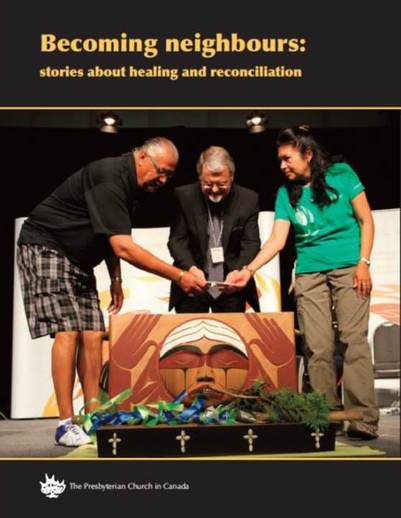Becoming Neighbours: stories about healing and reconciliation
This document is provided by the Presbyterian Church in Canada. While it is not written as a parent resource, I believe that there are many interesting stories which could ignite ideas for parents to use with their children.
Message from the General Secretary

As a national body, The Presbyterian Church in Canada has taken a number of
initiatives to acknowledge our denomination’s role and responsibility in the residential schools system, beginning with the adoption of the Confession by the 120th General Assembly on June 9, 1994.
The Presbyterian Church in Canada is a member of the All-Party Indian Residential Schools Settlement Agreement. With this Agreement, the Truth and Reconciliation Commission was established.
If those harmed by residential schools, and if subsequent generations are to find
healing and wholeness, truth must be spoken. Non-Aboriginal people must hear these truths, painful as they are. Otherwise how can reconciliation take place?
The journey to restore right relations between Aboriginal and non-Aboriginal people must happen in communities across Canada. This is where Presbyterians serve God - in communities across Canada.
The vast majority of non-Aboriginal Canadians have never visited a First Nations
community or one of the 119 Aboriginal Friendship Centres in Canada. How many non-Aboriginal people live near an Aboriginal community and yet don’t know their neighbours? Imagine the possibilities if non-Aboriginal people invited an Aboriginal elder to speak to their organization? Imagine the opportunities that might emerge from a partnership based on mutuality between Aboriginal and non-Aboriginal people working together for a common purpose. Such initiatives are taking place, but there is scope for much more.
It is this vision of neighbours becoming acquainted, learning from each other, at times listening to hard truths and sharing hospitality that gives rise to this program to support local initiatives involving Presbyterians and Aboriginal neighbours.
The thirteen projects listed in Becoming neighbours: stories about healing and
reconciliation are a sampling of the 59 projects supported through The Presbyterian Church in Canada’s Healing and Reconciliation Program. The projects vary in terms of scale and approach. These initiatives occurred in communities, big and small, rural and urban.
The common theme in each of these stories – and the many others that could not be included here - is a commitment to mutuality, to listening to difficult truths, to learning from Aboriginal people, to sharing hospitality and to being open to walking with Aboriginal neighbours in the journey toward truth and reconciliation.
Rev. Dr. Richard Fee
General Secretary, Life and Mission Agency
The Presbyterian Church in Canada
April 2013
initiatives to acknowledge our denomination’s role and responsibility in the residential schools system, beginning with the adoption of the Confession by the 120th General Assembly on June 9, 1994.
The Presbyterian Church in Canada is a member of the All-Party Indian Residential Schools Settlement Agreement. With this Agreement, the Truth and Reconciliation Commission was established.
If those harmed by residential schools, and if subsequent generations are to find
healing and wholeness, truth must be spoken. Non-Aboriginal people must hear these truths, painful as they are. Otherwise how can reconciliation take place?
The journey to restore right relations between Aboriginal and non-Aboriginal people must happen in communities across Canada. This is where Presbyterians serve God - in communities across Canada.
The vast majority of non-Aboriginal Canadians have never visited a First Nations
community or one of the 119 Aboriginal Friendship Centres in Canada. How many non-Aboriginal people live near an Aboriginal community and yet don’t know their neighbours? Imagine the possibilities if non-Aboriginal people invited an Aboriginal elder to speak to their organization? Imagine the opportunities that might emerge from a partnership based on mutuality between Aboriginal and non-Aboriginal people working together for a common purpose. Such initiatives are taking place, but there is scope for much more.
It is this vision of neighbours becoming acquainted, learning from each other, at times listening to hard truths and sharing hospitality that gives rise to this program to support local initiatives involving Presbyterians and Aboriginal neighbours.
The thirteen projects listed in Becoming neighbours: stories about healing and
reconciliation are a sampling of the 59 projects supported through The Presbyterian Church in Canada’s Healing and Reconciliation Program. The projects vary in terms of scale and approach. These initiatives occurred in communities, big and small, rural and urban.
The common theme in each of these stories – and the many others that could not be included here - is a commitment to mutuality, to listening to difficult truths, to learning from Aboriginal people, to sharing hospitality and to being open to walking with Aboriginal neighbours in the journey toward truth and reconciliation.
Rev. Dr. Richard Fee
General Secretary, Life and Mission Agency
The Presbyterian Church in Canada
April 2013
